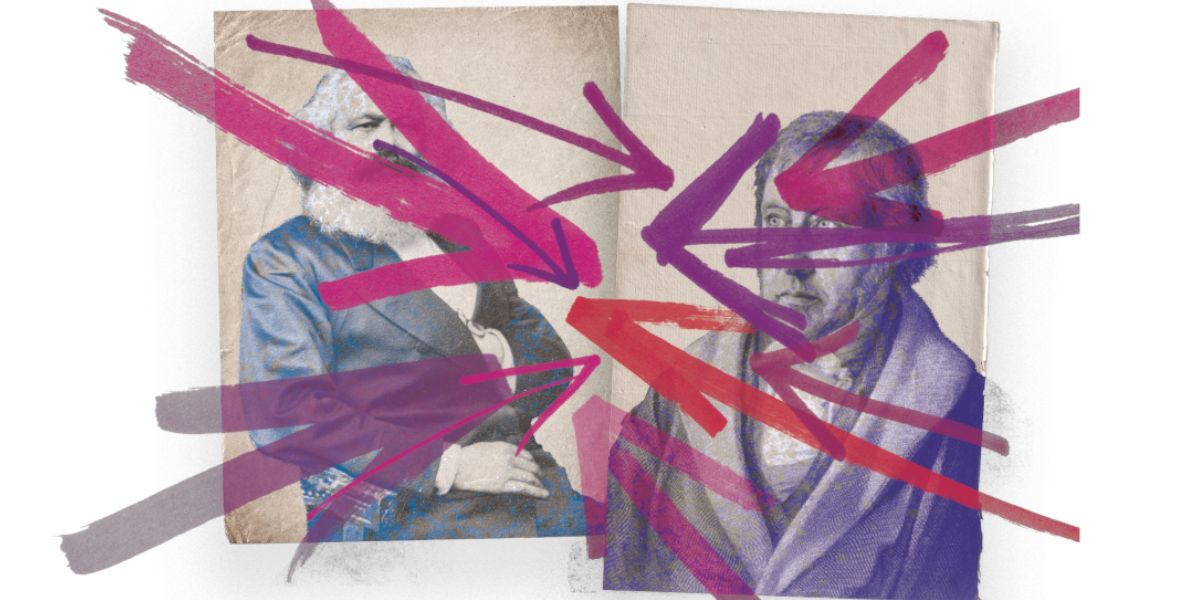The word ‘dialectics’ comes from the Greek dialektikḗ – a discussion through question and answer. For Aristotle, dialectics allows us to clearly formulate arguments based on commonly-held opinion: to think critically, we might now say, about common sense. Dialectics is grounded in the world as we find it but refuses to see any part of this world as immediately and obviously solid, or fixed: it refuses to take anything for granted.
One way of thinking of how Hegel sets up his Science of Logic is to consider Descartes’ attempt to doubt everything at the start of his Meditations and think about how that would have looked if he’d done it properly. Instead of moving from Descartes’ ‘I think’ to ‘therefore I am’, Hegel notes that even in doubting, there is thinking going on.
This means that there is something – there is Being. But what is Being? We can only understand that there is ‘something’ if we contrast this ‘something’ with its opposite: ‘Nothing’. So Being implies Nothing. If we think about Being and Nothing together, we get a movement: from existence to non-existence, like a light being turned on and off. This movement is Becoming. So the movement from Being to Nothing gets us Becoming.
This, for Hegel, is a dialectical process. It starts with some ‘abstract’ moment: Being, which we can’t understand on its own. This abstract moment implies its own ‘negation’: Nothing. In order to think the abstract and the negative together, we need the ‘concrete’: Becoming. Becoming is then supposed to dialectically imply Existence – and so on; the entire world built back up through thought.
Even a socialist society will need philosophical gadflies
Hegel was an idealist but his dialectics was more than just about metaphysics. For him, a dialectical process could be discovered at work throughout history – although his way of unpacking this was often couched in bizarre colonialist assumptions (Africa exists outside of history, apparently), as well as implying that all the contradictions in human history had been resolved in the Prussian state of his day.
Nonetheless, this idea inspired Marx – although he also challenged it. For Hegel, the contradictions driving human history existed in the realm of ideas. For Marx, by contrast, history is driven by conflicts between ‘real, active’ human animals, who in the first instance need things like food, shelter, and sex. Marx’s ‘dialectical materialism’ can be read as an attempt to demystify Hegel, bringing his idealism back down to earth.
Ultimately, these conflicts take the form of class struggle, which is supposed to resolve with the advent of a classless, communist state: human society finally finding a sustainable, lasting, concrete form. This is the essence of Marx’s dialectical materialism: through dialectics, the working class will be the first class to abolish itself.
Both Marx and Hegel’s dialectics might be criticised for not being thoroughgoing enough: for suggesting there is always supposed to come a point where dialectics leaves off. This was what Adorno, who insisted on a ‘negative’ dialectic, denied: that some final, positive resolution is ever supposed to be the point of history, humanity or thought.
If dialectics is the refusal to take anything at all for granted, then surely the dialectician should never allow themselves to be fobbed off with an answer: even a socialist society will need philosophical gadflies. The dialectician who never stops, is the most dialectical of all.










